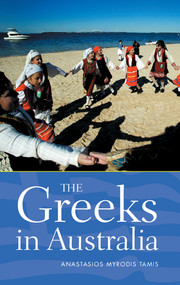5 - The Years of Respectability
Published online by Cambridge University Press: 22 September 2009
Summary
Greek Australians, utilising their experience as a nation of Diaspora during the last 2500 years, displayed an ability to engage in business and commerce with energy and ingenuity. Over the last 120 years of Australian migration they achieved prominence as food and services industrialists, while they managed to control the fishing and furniture manufacturing trades and to expand with resourcefulness in the taxi and development business. This was remarkable in view of their agrarian and proletarian backgrounds and the lack of capital and formal education upon arrival. Driven by their natural temperament as individualists determined to succeed and as independence-loving civilians, they managed to accumulate the initial capital to enable them to embark on business careers. Commerce appealed to the Greeks for a number of socio-psychological reasons. The desire to acquire status and social prominence to justify their emigration from the old country influenced some migrants. Others were motivated by the desire to amass wealth and secure a comfortable life and opportunities for themselves and their children. Some were driven by the perception that only via their financial ascent could they secure their Greek pride and self-esteem (filotimo). There were also those who were compelled to enter into business simply because of the hardships they had experienced as unskilled labourers and the inadequacy of wages.
Commencing as street vendors and peddlers selling fish, fruit and vegetables, with no command of English or substantial capital, the pioneer migrants managed to secure adequate returns.
- Type
- Chapter
- Information
- The Greeks in Australia , pp. 117 - 132Publisher: Cambridge University PressPrint publication year: 2005



